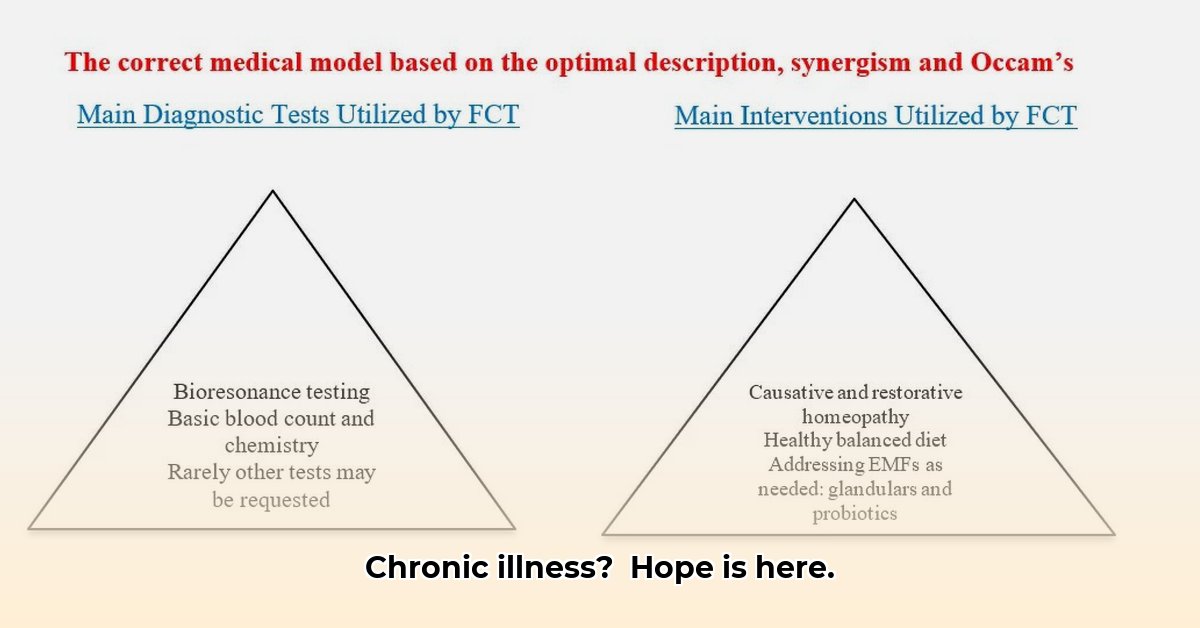Field Control Therapy (FCT), developed by Dr. Savely Yurkovsky, is presented as a novel approach that addresses chronic illnesses by targeting purported bioenergetic imbalances using homeopathic remedies. While some individuals report positive experiences with FCT, it’s crucial to acknowledge the limited scientific evidence supporting its claims. This informational article aims to provide a balanced perspective on FCT, exploring its principles, available evidence, potential upsides and downsides, and the critical need for further research to determine its true efficacy and safety.
Exploring the Core Principles of Field Control Therapy: Bioenergetic Healing?
Field Control Therapy (FCT) suggests that disruptions in the body’s subtle energy fields contribute to chronic health problems. These energy disturbances can manifest as physical symptoms and impact overall well-being. FCT practitioners believe these imbalances are the root cause of various ailments, and correcting them can resolve health issues. The therapy involves a detailed assessment of the individual’s unique energy profile, followed by the careful selection of homeopathic remedies intended to restore balance. Homeopathic remedies, according to the National Center for Complementary and Integrative Health, are based on the concept that “like cures like,” meaning that a substance that causes symptoms in a healthy person can cure similar symptoms in a sick person, though these are highly diluted.
The process often includes a thorough evaluation of the patient’s medical history, lifestyle, and symptoms. Practitioners may use techniques like muscle testing or electrodermal screening to detect these supposed energetic imbalances. Electrodermal screening (EDS) measures electrical resistance at specific points on the skin, often corresponding to acupuncture points, to detect changes in skin conductivity, which are believed to indicate the presence of toxins, pathogens, or energetic imbalances. It’s crucial to emphasize that these diagnostic methods and the underlying theoretical framework aren’t typically used or validated within conventional medicine. While the concept of subtle energy fields remains unproven, FCT attracts those seeking alternative solutions for chronic conditions.
Examining the Evidence For and Against FCT: What Does Available Data Say?
Many individuals who have tried FCT report significant improvements in their symptoms and overall health. These personal accounts often involve conditions that haven’t responded to traditional treatments which is undeniably encouraging. However, it’s vital to remember that these are individual experiences, not scientifically proven results. Large-scale, peer-reviewed studies, the gold standard in medical research, are lacking. Without these rigorous trials, it’s impossible to definitively say whether FCT is genuinely effective or if the reported improvements are due to other factors, such as the placebo effect or spontaneous remission. More data is needed to be truly sure.
While individual testimonials are valuable, they can’t replace robust scientific evidence. Many factors could contribute to the improvements reported by those using FCT, including other therapies they might be using simultaneously, the natural ebb and flow of symptoms, or simply the strong belief that they’re receiving a beneficial treatment. According to a study published in The Lancet, the placebo effect can account for up to 30% of symptom relief in some conditions. This highlights the critical importance of controlled studies to isolate and measure the specific effects of FCT. Additionally, the absence of a sound, testable model for chronic diseases, as argued by Dr. Savely Yurkovsky, the developer of FCT, complicates research efforts, making it challenging to establish clear points of reference and accurate diagnoses.
Potential Benefits vs. Risks: A Balanced Perspective on Field Control Therapy
Some people using FCT claim improvements in various chronic conditions. According to anecdotal evidence, they often report feeling better overall, having more energy, and experiencing a decrease in pain and inflammation. These benefits, however, are based on anecdotal evidence and not backed by rigorous scientific data.
However, the costs associated with FCT can be substantial and insurance coverage is typically not available, making it inaccessible to many. Furthermore, choosing FCT could mean delaying or forgoing potentially effective conventional treatments. This delay could have serious health ramifications. It’s crucial to understand that delaying necessary medical intervention for serious conditions could be detrimental to one’s health.
Here’s a summary of the potential risks associated with FCT:
| Risk Category | Specific Risk | Severity (Subjective) |
|---|---|---|
| Financial | High treatment costs, lack of insurance coverage | High |
| Information Bias | Reliance on anecdotal evidence, potentially misleading information | Medium |
| Delaying Conventional Care | Postponing or avoiding proven medical treatments | High |
| Unknown Side Effects | Potential for unanticipated adverse events | Unknown |
Regulatory Status and Future Research Avenues
Currently, the regulatory landscape surrounding FCT is quite open, primarily because it’s not backed by extensive scientific validation. This lack of regulation raises some concerns. While the lack of strict oversight allows for exploration, it also means there’s less protection for patients from potentially misleading claims. Greater scrutiny is certainly warranted to ensure patient safety and responsible clinical practice.
The future of FCT hinges on further research. Well-designed clinical trials are needed to properly evaluate its effectiveness and safety, comparing it to existing, proven treatments. These studies should use clear measurements to track improvements to provide a clear picture. According to the National Institutes of Health (NIH), rigorous clinical trials are essential for determining the safety and efficacy of any medical intervention. Only through this rigorous process can it be determined if FCT is a helpful therapeutic approach. Additionally, research into the bioenergetic principles underlying FCT, similar to Professor Robert Becker’s work on the body’s electrical properties, could provide a deeper understanding of its potential mechanisms and applications.
The Bottom Line: Approaching FCT with Cautious Optimism
In short, FCT presents a fascinating approach to chronic illness, but it’s crucial for individuals to approach it with cautious optimism. While anecdotal reports offer hope, the absence of scientific evidence prohibits definitively endorsing it. More research is urgently needed before drawing any firm conclusions about its efficacy and safety. For now, the best advice for anyone considering FCT is to discuss it thoroughly with their doctor, carefully weigh the risks and potential benefits, and maintain skepticism until strong scientific evidence emerges. Remember, health decisions should always be informed by the best available scientific evidence.
How to Find a Reputable Practitioner for Field Control Therapy
Key Takeaways:
- Field Control Therapy (FCT) is a holistic approach combining biophysics, homeopathy, and other methods, aiming to address the root causes of chronic illness.
- While anecdotal evidence suggests potential benefits, rigorous scientific backing is lacking.
- Choosing a practitioner requires careful consideration due to the lack of standardized training and regulation.
- It’s crucial to understand the limitations of FCT alongside its purported benefits.
- Integrating FCT with conventional medical care should be discussed with your doctor.
Understanding Field Control Therapy Principles
FCT, developed by Dr. Savely Yurkovsky, views illness not just as a symptom but as an energetic imbalance within the body. It uses techniques like bioresonance testing (often muscle testing or applied kinesiology) and electrodermal screening to identify these imbalances, as well as toxins and organ weaknesses. Treatment often involves homeopathic remedies tailored to individual needs. In essence, it is a highly personalized approach to the mechanics of the body, addressing root causes rather than simply managing surface symptoms. But, is it a viable option for everyone? That’s where critical thinking comes in, as claims made are substantial and require a high level of skepticism.
Muscle testing, one of the techniques utilized in FCT, is based on the idea that the body’s muscles weaken when exposed to substances or energies that are detrimental to health. Electrodermal screening measures electrical resistance at specific points on the skin to detect energetic imbalances. However, according to the Mayo Clinic, muscle testing lacks scientific validity and is not a reliable diagnostic tool. The scientific community also largely disputes the reliability and validity of electrodermal screening.
The Evidence: A Balanced View is Paramount
While many patients report improvement after FCT, significant scientific validation is currently absent. Case studies and anecdotal evidence exist, but large-scale, peer-reviewed studies are needed to confirm its effectiveness. Think of it like a promising new plant — we see it thriving in some gardens, yet we lack the rigorous testing to know if it will flourish everywhere. The challenge is to differentiate between genuine therapeutic effects and the placebo effect, spontaneous remission, or other confounding factors.
Weighing Potential Benefits and Risks Associated with FCT
Anecdotally, FCT is reported to help with various ailments by promoting the body’s natural healing mechanisms. However, significant risks exist. Delaying or avoiding established medical treatments based solely on FCT could be detrimental. The financial commitment can be substantial, and, without proper scientific backing, the information shared might be misleading or inaccurate.
| Benefit | Risk |
|---|---|
| Improved symptoms and overall well-being | Lack of scientific evidence; financial burden |
| Personalized treatment plan | Potential for misdiagnosis or ineffective treatment |
| Addressing root causes | Delaying or forgoing conventional medical care |
How to Find a Reputable Practitioner for Field Control Therapy
Finding a qualified practitioner is crucial, yet challenging given the lack of regulatory oversight. Here’s what to do:
- Thorough Research: Look for practitioners with extensive experience and a strong track record. Check online reviews and testimonials. However, be wary of testimonials that seem too good to be true, and look for reviews on independent websites.
- Consult Multiple Sources: Don’t rely solely on one source of information. Discuss FCT with a primary care doctor to weigh the pros and cons. According to the American Medical Association, patients
- Stainless Steel Food Storage for Healthier, Eco-Friendly Meal Prep - February 27, 2026
- Stainless Food Containers Offer Durable Storage for Everyday Meals - February 26, 2026
- Stainless Steel Containers Offer Superior Food Preservation and Durability - February 25, 2026










